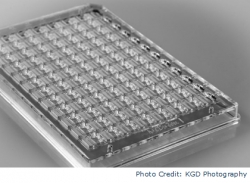MiTeGen Announces Their In Situ-1 Crystallization Plates Have Been Selected for Use in Microgravity Crystallization Experiments Aboard the International Space Station
MiTeGen LLC, a provider of innovative consumables for protein crystallization and X-ray diffraction to academic, pharmaceutical, industrial and government researchers around the world, announced that a line of their products, the In Situ-1™ crystallization plates, will be used for research conducted on the International Space Station (ISS).

Ithaca, NY, March 24, 2016 --(PR.com)-- The crystallization plates are currently scheduled to be flown to the ISS in April aboard the SpaceX CRS-8 mission. Once there, they will be used in protein crystallization experiments being conducted by researchers from Eli Lilly and Company.
“We are tremendously excited here to know that these plates will be going into outer space and used at the forefront of microgravity crystallization experiments,” says Ben Apker, Director of Business Development at MiTeGen. “One of our top 3 design goals was to design a crystallization plate that would push the boundaries of earth-based crystallization and sample transport. To have it be chosen for use aboard the International Space Station is a testament as to how well the design goal was met.”
MiTeGen's In Situ-1™ crystallization plate (an SBS standard, 96-well microplate) enables X-ray crystallography researchers, who study the atomic-level structures of biological samples, to easily grow, transport and screen crystals of their targets. The advanced features of the low-profile plates, many of which have never before been seen in a crystallization plate, allow for samples to be easily grown with more reproducible conditions, safely shipped to a location for data collection, and sub-sequentially studied via X-ray diffraction in situ. Researchers can then learn about the inherent quality of their crystal samples without having to manipulate, or manually retrieve them, which can often cause undesired changes or damage to the samples.
“We feel the reservoir-solution retention features that were included in the plate design provide a benefit for work in microgravity,” says Rob Newman, CEO of MiTeGen. “We are looking forward to hearing how these experiments go and expect these plates help to enable a new era studies of protein crystal growth in microgravity.”
The crystallization payload from Eli Lilly and Company slated for launch to the ISS is in coordination with the Center for the Advancement of Science in Space (CASIS). Selected by NASA in July 2011 to maximize use of the ISS U.S. National Laboratory through 2020, CASIS is dedicated to supporting and accelerating innovations and new discoveries that will enhance the health and wellbeing of people and our planet.
About MiTeGen
Because our customers’ research is important, we provide innovative tools and solutions that measurably improve the ease, reproducibility, and quality of their experiments. MiTeGen engineers, manufactures and distributes a full range of the leading products for the crystallization, crystal harvesting, cryocooling and X-ray diffraction data collection of proteins, viruses and small molecule/inorganic compounds. Our customers include academic, medical, pharmaceutical, government and industrial laboratories in more than 45 countries. Founded in 2004, MiTeGen is based in Ithaca, NY. More information can be found at www.mitegen.com
“We are tremendously excited here to know that these plates will be going into outer space and used at the forefront of microgravity crystallization experiments,” says Ben Apker, Director of Business Development at MiTeGen. “One of our top 3 design goals was to design a crystallization plate that would push the boundaries of earth-based crystallization and sample transport. To have it be chosen for use aboard the International Space Station is a testament as to how well the design goal was met.”
MiTeGen's In Situ-1™ crystallization plate (an SBS standard, 96-well microplate) enables X-ray crystallography researchers, who study the atomic-level structures of biological samples, to easily grow, transport and screen crystals of their targets. The advanced features of the low-profile plates, many of which have never before been seen in a crystallization plate, allow for samples to be easily grown with more reproducible conditions, safely shipped to a location for data collection, and sub-sequentially studied via X-ray diffraction in situ. Researchers can then learn about the inherent quality of their crystal samples without having to manipulate, or manually retrieve them, which can often cause undesired changes or damage to the samples.
“We feel the reservoir-solution retention features that were included in the plate design provide a benefit for work in microgravity,” says Rob Newman, CEO of MiTeGen. “We are looking forward to hearing how these experiments go and expect these plates help to enable a new era studies of protein crystal growth in microgravity.”
The crystallization payload from Eli Lilly and Company slated for launch to the ISS is in coordination with the Center for the Advancement of Science in Space (CASIS). Selected by NASA in July 2011 to maximize use of the ISS U.S. National Laboratory through 2020, CASIS is dedicated to supporting and accelerating innovations and new discoveries that will enhance the health and wellbeing of people and our planet.
About MiTeGen
Because our customers’ research is important, we provide innovative tools and solutions that measurably improve the ease, reproducibility, and quality of their experiments. MiTeGen engineers, manufactures and distributes a full range of the leading products for the crystallization, crystal harvesting, cryocooling and X-ray diffraction data collection of proteins, viruses and small molecule/inorganic compounds. Our customers include academic, medical, pharmaceutical, government and industrial laboratories in more than 45 countries. Founded in 2004, MiTeGen is based in Ithaca, NY. More information can be found at www.mitegen.com
Contact
Mitegen, LLC
Robert Newman
607-266-8877
www.mitegen.com
Robert Newman
607-266-8877
www.mitegen.com
Categories
